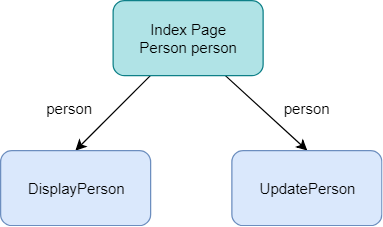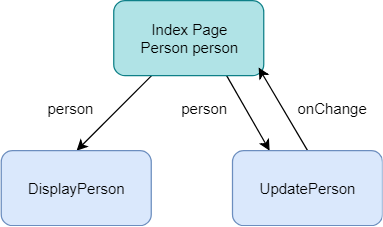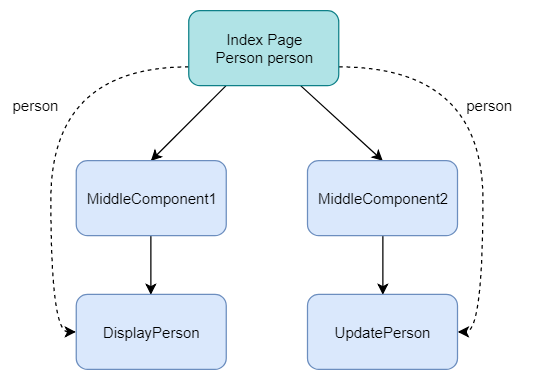This article explores event delegation in Blazor 0.7.0
The source code for this article can be found here
This article is part of a Blazor state management exploration series.
- Blazor State Management Part I - Data-Binding
- Blazor State Management Part II - Event Delegation
- Blazor State Management Part III - Cascading Parameters
Previously, we developed a sample application in order to explore data-binding in Blazor. Here is the current component structure of our sample application.

The index page shares a Person object to two components, DisplayPerson and UpdatePerson. Changes to person that occur in UpdatePerson do not show up in DisplayPerson. At least, not automatically. This behavior was observed and discussed in the previous article.
So how does one share objects across components and ensure that components are working with, and reflecting the most up-to-date state? One way to solve this problem is to use event delegation.
Event delegation refers to the process of using event propagation (bubbling) to handle events at a higher level in the DOM than the element on which the event originated.
Instead of handling events in UpdatePerson, events are bubbled up to the index page. The index page will handle the event, make changes to person and propagate the changes to child components. UpdatePerson and DisplayPerson in this case.
Event handler
Add the following HandleChange method to the index.cshtml page. HandleChange will respond to input changes that occur in UpdatePerson, updating the person’s name and calling StateHasChanged to rerender the UI.
@* index.cshtml *@
...
@functions {
...
private void HandleChange (UIChangeEventArgs e)
{
person.Name = e.Value.ToString();
StateHasChanged();
}
}Event Propagation (Bubbling)
The HandleChange event handler is in place. Now, we need to change UpdatePerson to bubble onchange events up to index/HandleChange. We can do this by adding a custom component parameter to UpdatePerson.
@* UpdatePerson *@
...
@functions {
...
[Parameter] protected Action<UIChangeEventArgs> CustomOnChange { get; set; }
private void OnChange(UIChangeEventArgs e)
{
CustomOnChange?.Invoke(e);
}
}The custom parameter, CustomOnChange, is defined as an Action<UIChangeEventArgs>. Actions are methods that except some list of parameters, UIChangeEventArgs in this case, and return nothing (null). Notice that this action defines a method that matches the HandleChange method signature. I think you can see where we are going here.
The final piece of the puzzle, wiring up the components. Update the index page to pass in HandleChange to UpdatePerson.
@* index.cshtml *@
...
<UpdatePerson person="@person"
CustomOnChange="@HandleChange"></UpdatePerson>
...Essentially, we are exposing the onchange event from UpdatePerson to index as a custom event, CustomOnChange, and handling the event with HandleChange.
Launching this application and updating the name in the input field will show that DisplayPerson now updates to reflect the current name. Finally, we have a way to share objects across components.
Conclusion
We started with one component structure/relationship and, through this article, and minor tweaks, we ended up with

Event delegation provides a way to organize components in a way that allows for sharing state across components. The process for using event delegation for this purpose is to 1) identify a parent component that will “own” the data and 2) bubble events/changes from child components up to the parent component, the one that “owns” the data, to handle changes.
There are some drawbacks to this method of sharing state. For example, how do we handle the following case?

In this case, DisplayPerson and UpdatePerson still need access to person but the middle components know nothing about person and don’t need to. We could update middle components to accept person parameters and pass them through to the child components that need it. We would also need to pass event handlers from the parent component through middle components down to child components. A doable process but messy and cumbersome. We will explore alternative solutions for handling this case in future articles.
Event delegation is only one of many methods for sharing data across components. We will examine other methods in future articles.